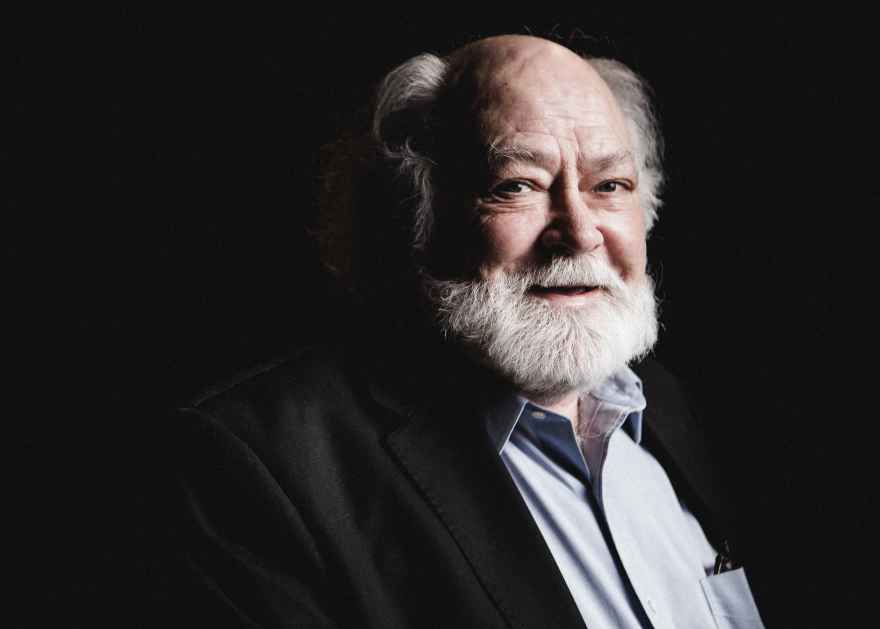D. Nicholas Rudall, distinguished UChicago professor, playwright, and founding director of the Court Theatre, 1940–2018

A renowned Classics professor, playwright, translator, actor, and founding director of the Court Theatre, D. Nicholas Rudall passed away surrounded by his family on June 19 in Tucson, Ariz., at age 78. He died due to complications from colon and liver cancer. Throughout his professional life, he lived in two worlds: the classroom by day and the theater by night.
“Nick was my colleague in Classics, but as an actor he also had a completely separate side to his life,” says Peter White, UChicago professor of Classics. “He was so stimulating to be around—whether we were sharing the same office and discussing our work and our students or when I saw him acting in a play at the Court Theatre. Only at University of Chicago would I have crossed paths with a Classicist like Nick.”
For 40 years, Rudall taught the classic plays to UChicago students while also leading the Court Theatre for 22 years. Over the years, he transformed the Court Theatre from an outdoor amateur summer theater into a highly regarded professional theater company focused on classic work.
In his classes at UChicago, Rudall taught students everything from the ancient Greeks and Shakespeare through Chekhov and Tony Kushner. His academic specialty of Greek drama spilled over to his work at the Court Theatre, and Rudall productions of Euripides’s Medea (1971), Moliere’s The Doctor In Spite of Himself (1975), Iphigenia in Aulist (2014) became staples of the theatre’s repertoire. He appeared in many roles as an actor, winning a Joseph Jefferson Award for best actor as the title role in Butley and best supporting actor as Joxer in Juno and the Peacock.
“Nick made such a difference to so many in so many ways, but what most impressed me about him was his voice,” says James Chandler, Barbara E. and Richard J. Franke distinguished service professor and director of the Franke Institute. “You would see a live performance by Nick—as Prospero, or Butley, or Pinter’s Mick—and you know he has great acting chops.
“But the power of that voice was clearest to me when we traveled in Ireland in 1998 lecturing for UChicago alumni. Our division of labor was that he would read the poems aloud, and I was supposed to explain them. But sometimes after he’d given us, say, Yeats’s “Sailing to Byzantium,” his voice revealed so much about the poem that there almost didn’t seem to be anything left to say.”
In addition to the Court Theatre, the world’s leading theater companies, including the Washington, D.C.-based Shakespeare Theatre Company, have used his translations and adaptations of classic European plays from Sophocles, Aristophanes, Feydear, to Henrik Ibsen.
Born in 1940 in the Lanelli, Wales, Rudall was the son of a Welsh steelworker, who spent his summers as a clay boy until he won a scholarship to the elite Llandovery boarding school, where his love for theater began. Rudall was the first boy from his village to attend a Cambridge college at Clare College, where he earned his bachelor’s degree in 1962. He moved to the U.S. for his doctoral degree in classical languages and literature at Cornell University in 1966.
Joining the UChicago faculty in 1966, Rudall focused on tragedy and ancient theater, and was promoted to full professor in 2001, retiring in 2006. Celebrated for his teaching collaboration with UChicago Shakespearean David Bevington, the two professors created and co-taught a two-quarter sequence entitled “History and Theory of Drama” for many years.
“Nick taught me whatever I know about Western drama,” says David Bevington, one of the world’s top Shakespeare experts and the Phyllis Fay Horton distinguished service professor emeritus in the Humanities. “He encouraged the students and myself to take a much closer look at the texts until they live and breathe.”
Rudall’s tenure at the Court Theatre began in 1970 when UChicago President Edward H. Levi asked him to step in and create a professional theater. Rudall served as Artistic Director of Court Theatre starting in 1972 and was promoted to Executive Director in 1980, holding this position until his retirement in 1994.
“Nick and I shared an interest in experimental theater,” says Jerome McGann, a former professor at UChicago. “In 1969, we staged a production of Lord Byron’s play Cain, which is a series of arguments between Cain and the Devil. It is rarely produced and very difficult to stage, but Nick had a great imagination and the play was a big success. I will remember Nick as a great director, fine actor, fine dramaturge, and producer, as well as an extremely convivial buddy.”
A skilled translator, Rudall began translating and adapting the classics himself such as Euripides’s Bacchae, The Trojan Women and The Iphigenia Plays. The Chicago publisher, Ivan R. Dee, published many of Rudall’s versions of Greek tragedies.
Three weeks before his death, Rudall finished writing his last play, Never Give Up Hope. The plot centers on a poet and his wife living in Russia, where the poet is persecuted for his work. After the poet is murdered, his wife escapes the country. After memorizing all his poems, his wife recites them and saves his artistic legacy.
On June 8, the Director of the Court Theatre, Charles Newell, had a reading performed of his new play Never Give Up Hope, so Rudall could hear it before his imminent death. Like his last play, Rudall’s legacy will live on through performances of his plays in theaters across the globe and in the memories of his many friends at UChicago.